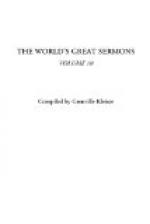at work. The Holy Spirit worketh! Grace
worketh! Faith worketh! Love worketh!
Hope worketh! Prayer worketh! And there
are other allies robed in less attractive garb.
“Tribulation worketh!” “This light
affliction worketh.” “Godly sorrow
worketh!” On every side of him the apostle conceives
cooperative and friendly powers. “The mountain
is full of horses and chariots of fire round about
him.” He exults in the consciousness of
abounding resources. He discovers the friends
of God in things which find no place among the scheduled
powers of the world. He finds God’s raw
material in the world’s discarded waste.
“Weak things,” “base things,”
“things that are despised,” “things
that are not,” mere nothings; among these he
discovers the operating agents of the mighty God.
Is it any wonder that in this man, possessed of such
a wealthy consciousness of multiplied resources, the
spirit of a cheery optimism should be enthroned?
With what stout confidence he goes into the fight!
He never mentions the enemy timidly. He never
seeks to underestimate his strength. Nay, again
and again he catalogs all possible antagonisms in
a spirit of buoyant and exuberant triumph. However
numerous the enemy, however subtle and aggressive
his devices, however towering and well-established
the iniquity, however black the gathering clouds, so
sensitive is the apostle to the wealthy resources of
God that amid it all he remains a sunny optimist,
“rejoicing in hope,” laboring in the spirit
of a conqueror even when the world was exulting in
his supposed discomfiture and defeat.
And, finally, in searching for the springs of this
man’s optimism, I place alongside his sense
of the reality of redemption and his wealthy consciousness
of present resources his impressive sense of the reality
of future glory. Paul gave himself time to think
of heaven, of the home of God, of his own home when
time should be no more. He loved to contemplate
“the glory that shall be revealed.”
He mused in wistful expectancy of the day “when
Christ who is our life shall be manifested,”
and when we also “shall be manifested with him
in glory.” He pondered the thought of death
as “gain,” as transferring him to conditions
in which he would be “at home with the Lord,”
“with Christ, which is far better.”
He looked for “the blest hope and appearing
of the glory of our great God and Savior Jesus Christ,”
and he contemplated “that great day” as
the “henceforth,” which would reveal to
him the crown of righteousness and glory. Is any
one prepared to dissociate this contemplation from
the apostle’s cheery optimism? Is not rather
the thought of coming glory one of its abiding springs?
Can we safely exile it from our moral and spiritual
culture? I know that this particular contemplation
is largely absent from modern religious life, and
I know the nature of the recoil in which our present
impoverishment began. “Let us hear less
about the mansions of the blest and more about the
housing of the poor!” Men revolted against an




